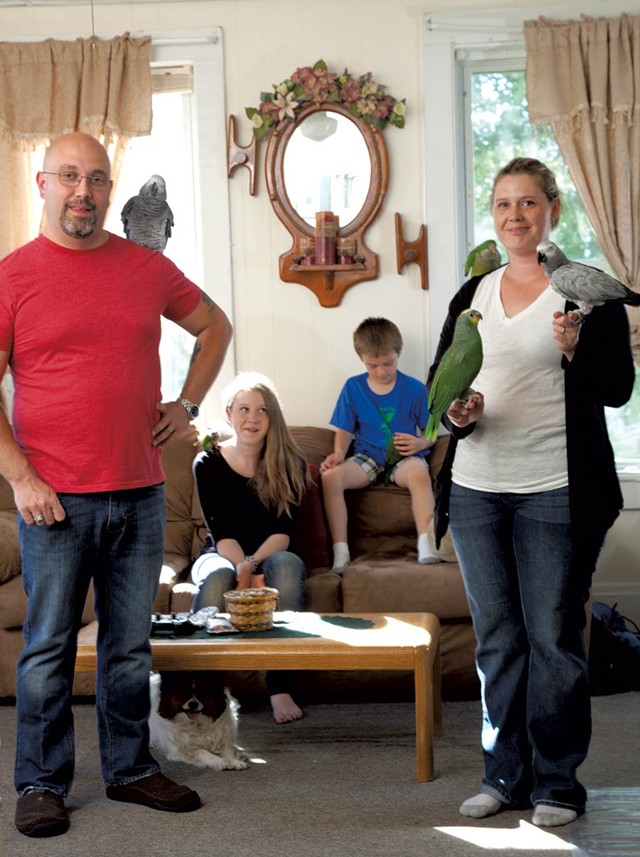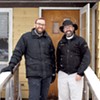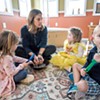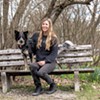Published June 25, 2014 at 10:00 a.m.
Tony and Mysty Olson never intended to open an exotic-bird shelter. They had no business plan, no late-night talks about turning their passion into a job, and they didn't research applicable regulations. They simply received a steady flow of inquiries once word got around that the Olsons had seven pet birds.
"Could you take one more?" people would ask. "How about another?"
The Olsons never found a way to say no.
Last August, the couple decided that, like it or not, they were in the bird-rescue business. So they officially turned their modest St. Albans home into Feathered Hearts Avian Rescue. They believe it's the only shelter exclusively for exotic birds in northern New England.
"We were considering it and then got poked into it quicker," Mysty says. "We wanted to make sure all our [pet] birds got the love and attention they needed."
The Olsons determined that their home had room for more. And the birds flew in: Within weeks, they were providing foster care for 10 birds, including parrots, cockatiels and parakeets. Feathered Hearts has housed nearly 50 caged birds at one time, though last week that number was down to just seven — six of their own and one foster pet.
Both Olsons work full time and have two children, ages 9 and 14, at home. But tending to their foster flock, and driving across New England to pick up birds that their owners are ready to abandon, has become a second full-time gig.
"We don't go on vacation," Mysty says. "We don't have free time. We don't know what that is."
Though they have subsequently developed a website and Facebook page and taken out a few local advertisements, for months the Olsons received birds simply through word of mouth in their relatively small network of veterinarians, pet-shop owners, animal-control officers and bird owners.
They received an unexpected influx when the only avian shelter in New Hampshire closed last year, Mysty says. Maine has no similar shelter, either, she believes.
"Word travels fast," she observes.
Tony grew up with birds in his house, and only recently persuaded his wife that it was time for their family to have some of their own. Their oldest bird, Lillie, is 2 years old.
What is it about birds that inspires the couple to devote so much time and energy to their feathered friends?
"You have to earn their love and respect. And once you have it, there's nothing like bird love," Mysty explains. "They are very companion oriented. They want to be with their person. They are lovable and caring. They are like toddlers."
Since August, the Olsons say they have "re-homed" more than 100 birds. At their peak, they had 47 birds at once, after a Vermont woman dropped off 30 finches. They found homes for every one, even with the stipulation that potential owners take at least two, so each bird would have a companion.
Shelburne veterinarian Liam Bisson says the Olsons are providing a desperately needed service. People generally know what to expect with a cat or dog. Birds are often a different story, the vet says, and ill-prepared owners often give up.
"They don't know what they're getting into," Bisson says. "They want a bird from the movies, sitting on their shoulder, talking to them. They don't all do that. It takes training and work."
Another surprise to some owners is that domesticated birds live longer than most pets — and even some humans. Many survive more than 30 years; some parrots make it to 80 or 90. The Olsons have received pets from overwhelmed family members of bird owners who had passed away and made no provisions for their birds.
Surviving relatives often "don't want the bird or don't know how to take care of it," Bisson notes.
(The Olsons have made provisions in their will that two of their pets with the longest expected life spans — an African Gray and an Amazon parrot — will go to their children.)
It's true that caring for birds is trickier than many prospective owners anticipate. Their dietary needs are complex, for starters. While many owners feed their birds only seeds, healthier diets include a pricier mix of fruits, vegetables and vitamins.
Birds can also be particular about their surroundings: Some don't like being around other birds, or children. Cats could be a problem. Homes also have to be adequately heated. Some birds do well in cages, but others should be free to roam.
And — though it should be obvious — birds can be quite noisy. One woman who donated a parrot to the Olsons worked at home and found that her "obnoxiously loud" bird interfered with her tasks.
Hyde Park resident Andrea Vartanian gave up her two cockatiels, Peep and Squeak, in the fall after one of them showed signs of emotional issues — he picked his feathers nonstop and shrieked constantly — and Vartanian struggled to administer proper care.
"It broke my heart to surrender them," she says. "I have never surrendered any animal in all my life, and felt like a failure. Mysty ... talked me through my tears. She was reassuring and shared stories with me that were similar to my situation."
The Olsons took in the pets, and have since found Peep and Squeak a new home.
Tony and Mysty Olson declined to divulge how much they have spent on their rescue efforts but they concede they've spent several thousand dollars that they don't ever expect to recoup. They don't require surrender fees, unlike many humane societies, though the couple sometimes receives donated food and cages from pet stores, vets and fellow animal lovers from Vermont and New Hampshire.
But Feathered Hearts will have to find revenue streams in order to stay viable. To cut costs, Mysty has been making handmade bird toys and is planning to sell them online to benefit the shelter.
The Olsons are also thinking about touring the state to offer classes that would educate people on proper bird care.
"It's sad that we need to exist, and it's sad that people don't do this kind of work," Mysty says.
She and Tony initially fretted that running the shelter would require pricey government licenses and permits, but, to their relief, the Agency of Agriculture said they did not need state approval as long as they were doing it inside their home.
The Olsons make sure their adopted birds get exams from Bisson, even though taking that step is not mandated.
"They're doing great work. They're nice people and very good with the birds, very thorough," the vet says.
Luckily, the Olsons haven't heard any complaints from the town or their neighbors. Though the birds can squawk loudly, they generally go to sleep when the sun goes down, Mysty says.
Some birds even have bedtime rituals: Their Quaker parrot is in the habit of saying "Night night night night," at sunset, and their cockatoo pulls a small blanket kept in his cage around his body.
"We didn't realize how much of a need there was," Mysty says of the bird-rescue biz. "We had a lot of people call us and say that if we didn't come take [their birds], they would throw them out. We will never get our money back, but somebody has to look after them."
featheredheartsrescue.webs.com
The original print version of this article was headlined "Bye Bye Birdies"
More By This Author
About the Artist

Matthew Thorsen
Bio:
Matthew Thorsen was a photographer for Seven Days 1995-2018. Read all about his life and work here.
Matthew Thorsen was a photographer for Seven Days 1995-2018. Read all about his life and work here.
Speaking of...
-

Teen Tweets: Burlington Middle Schoolers Make Colorful Avian Collages
Mar 12, 2024 -

Birding Tips From the Bird Diva
Mar 12, 2024 -

The Vermont Institute of Natural Science Opens a New Songbird Aviary
Aug 10, 2022 -

A Birder Needs Help to Keep Dead Creek Clear of Harmful Invasives
Jul 6, 2022 -

Video: Julianna and Sophia Parker of Otter Creek Wildlife Rescue Help Animals — and Humans, Too
Jun 30, 2022 - More »
Comments
Showing 1-1 of 1
Comments are closed.
From 2014-2020, Seven Days allowed readers to comment on all stories posted on our website. While we've appreciated the suggestions and insights, right now Seven Days is prioritizing our core mission — producing high-quality, responsible local journalism — over moderating online debates between readers.
To criticize, correct or praise our reporting, please send us a letter to the editor or send us a tip. We’ll check it out and report the results.
Online comments may return when we have better tech tools for managing them. Thanks for reading.
















































